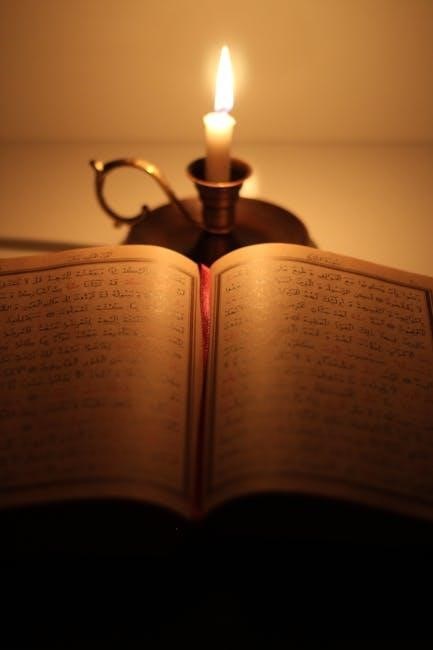Night by Elie Wiesel is a haunting memoir about the Holocaust‚ detailing the author’s harrowing experiences as a young boy in Nazi concentration camps․ Through vivid descriptions and emotional depth‚ Wiesel shares his journey of faith‚ loss‚ and survival‚ providing a powerful insight into one of history’s darkest periods․ The book serves as a testament to human resilience and the enduring impact of genocide‚ making it a crucial read for understanding the Holocaust’s atrocities and its lasting effects on humanity․
1․1 Historical Context of the Holocaust
The Holocaust‚ occurring between 1941 and 1945‚ was the systematic‚ state-sponsored extermination of six million Jews by the Nazis and their collaborators․ Rooted in Adolf Hitler’s antisemitic ideology‚ the Holocaust was part of the “Final Solution‚” a plan to eliminate Jews from Europe․ Nazi Germany‚ under Hitler’s leadership‚ implemented this genocide through concentration camps‚ ghettos‚ and mass executions․ The Holocaust began with discrimination and segregation‚ escalating into forced deportations and mass murder․ Elie Wiesel’s Night provides a personal account of this horrific period‚ illustrating the atrocities committed in camps like Auschwitz․ The Holocaust remains one of history’s darkest chapters‚ serving as a stark reminder of humanity’s capacity for evil and the importance of vigilance against prejudice․
1;2 Elie Wiesel’s Background and Motivation for Writing
Elie Wiesel‚ born in 1928 in Sighet‚ Romania‚ was raised in a devout Jewish family․ His early life was marked by a deep commitment to religious studies‚ particularly the Talmud and the Cabbalah․ The Holocaust shattered his world when he and his family were deported to Auschwitz in 1944․ After surviving the concentration camps‚ Wiesel dedicated his life to sharing the atrocities he witnessed‚ becoming a prominent voice against injustice․ Motivated by a desire to honor the memory of the victims and to prevent future genocides‚ Wiesel wrote Night as a testament to the Holocaust’s horrors and a call for humanity to remember its past․ His work has become a cornerstone of Holocaust literature‚ ensuring that the world never forgets the unimaginable suffering endured during this dark period․
Plot Summary
Night traces Eliezer Wiesel’s harrowing journey through the Holocaust‚ from his peaceful life in Sighet to the horrors of Auschwitz‚ exploring themes of faith and survival․
2․1 Early Life in Sighet
Eliezer Wiesel‚ a devout Jewish boy‚ grows up in the small town of Sighet‚ Transylvania‚ surrounded by a close-knit family and a vibrant religious community․ His father‚ a respected figure‚ is involved in community affairs‚ while his mother manages the family․ Eliezer is deeply rooted in his faith and yearns to study the Kabbalah‚ seeking spiritual enlightenment․ The community is initially unaware of the looming Nazi threat‚ living in a state of innocence and denial․ This peaceful existence is shattered when the Nazis invade‚ forcing Eliezer and his family into a nightmarish journey that will forever alter his life and faith․
2․2 The Journey to Auschwitz
The Wiesel family is forced into cattle cars for a harrowing journey to Auschwitz‚ marking the start of their Holocaust ordeal․ The cramped and unsanitary conditions lead to despair and death among the passengers․ Eliezer witnesses the brutal treatment of fellow prisoners‚ including the tragic fate of Mrs; Schächter‚ whose warnings of fire and death fall on deaf ears․ The journey symbolizes the dehumanization of the victims‚ stripping them of dignity and hope․ Upon arrival‚ the family is separated‚ and Eliezer is left with his father‚ entering a realm of unimaginable horror that tests their will to survive and maintain their humanity․
2․3 Life in the Concentration Camps
In the concentration camps‚ Eliezer and his father endure unimaginable suffering․ The harsh conditions of Auschwitz and later Buchenwald expose them to forced labor‚ starvation‚ and constant fear of death․ The lack of basic necessities like food‚ water‚ and shelter pushes them to the brink of survival․ Eliezer witnesses the brutality of the Nazi guards and the moral degradation of prisoners‚ leading to a crisis of faith․ The relationship between Eliezer and his father becomes a lifeline‚ though it is tested by the extreme circumstances․ The camps reveal the depths of human depravity while also highlighting the resilience of the human spirit‚ as Eliezer struggles to hold on to his humanity amidst the atrocities․

Character Analysis

Eliezer‚ a spiritual youth‚ undergoes a harrowing journey of faith and doubt․ His father embodies resilience‚ while Moishe the Beadle and the young boy symbolize moral decline․ Together‚ they illustrate the struggle for survival and humanity in unimaginable circumstances․
3․1 Eliezer (Elie Wiesel)
Eliezer‚ a 15-year-old Orthodox Jewish boy‚ is the narrator and protagonist of Night․ At the beginning‚ he is deeply religious‚ seeking to understand the mysteries of the Cabala․ His faith is central to his identity‚ but the horrors of the Holocaust gradually erode his belief in God’s justice․ Witnessing unimaginable atrocities‚ including the hanging of a young boy‚ Eliezer’s spiritual struggle intensifies‚ leading to a crisis of faith․ Throughout the book‚ his relationship with his father becomes a source of both strength and sorrow․ Eliezer’s transformation from a devout believer to a questioning survivor underscores the psychological and emotional toll of the Holocaust․
3․2 Eliezer’s Father
Eliezer’s father‚ a respected member of the Sighet community‚ plays a crucial role in the story․ He embodies tradition and responsibility‚ initially dismissing warnings of Nazi threats․ His decision to stay in Sighet despite looming danger reflects his ties to home and community․ In the concentration camps‚ his physical decline and eventual death deeply impact Eliezer‚ highlighting the emotional and moral challenges of survival․ The father’s presence underscores themes of family bonds‚ sacrifice‚ and the struggle to maintain humanity amidst unimaginable cruelty․ Their relationship evolves from one of admiration to mutual reliance‚ ultimately leaving a lasting emotional scar on Eliezer․
3․3 Moishe the Beadle
Moishe the Beadle is a pivotal character in Night‚ serving as a spiritual guide and mentor to young Eliezer․ A poor‚ yet deeply pious man‚ Moishe introduces Eliezer to the mystical teachings of the Kabbalah‚ fostering his spiritual curiosity․ His gentle nature and unwavering faith make him a beloved figure in the Jewish community of Sighet․ After being deported by the Nazis and miraculously returning‚ Moishe warns the villagers of the horrors he witnessed‚ describing the brutal mass killings he saw․ However‚ his warnings fall on deaf ears‚ as the community refuses to believe such atrocities could occur․ Moishe’s transformation from a calm‚ devout man to a haunted‚ broken individual underscores the shocking reality of the Holocaust and serves as a grim foreshadowing of the horrors to come․
3․4 The Pipel (The Young Boy)
The Pipel‚ a young boy in the concentration camp‚ is a tragic figure whose execution profoundly affects Eliezer․ Despite his youth‚ the Pipel is accused of being a spy and faces a brutal death by hanging․ His innocence and the cruelty of the Nazis are highlighted as he cries out for his mother in his final moments․ This event deeply shakes Eliezer‚ intensifying his struggle with faith and the existence of evil․ The Pipel’s death symbolizes the senseless destruction of innocence during the Holocaust and serves as a poignant reminder of the dehumanizing effects of the concentration camps on the youngest victims․
Major Themes
Night explores themes of faith‚ doubt‚ dehumanization‚ survival‚ hope‚ and loss‚ reflecting Eliezer’s emotional and spiritual journey through the Holocaust’s unimaginable horrors and moral complexities․
4․1 Faith and Doubt
Faith and doubt are central to Night‚ as Eliezer grapples with his spiritual beliefs amidst the Holocaust’s atrocities․ Initially devout‚ he seeks divine justice but gradually questions God’s presence․ Witnessing unimaginable suffering‚ including the hanging of a young boy‚ his faith falters․ The novel portrays his internal struggle: clinging to hope yet confronting the void of divine silence․ This theme reflects broader existential questions‚ making Eliezer’s journey a powerful exploration of belief‚ doubt‚ and the search for meaning in chaos․ The tension between faith and doubt underscores human resilience and the complexities of maintaining spirituality in the face of profound evil․
4․2 Dehumanization and Survival
Dehumanization is a pervasive theme in Night‚ illustrating how the Holocaust stripped individuals of their humanity․ The Nazis employed systematic methods to dehumanize Jews‚ such as assigning numbers instead of names and forcing them into inhumane living conditions․ This dehumanization made survival a constant struggle‚ both physically and morally․ Eliezer witnesses and experiences the brutal treatment that reduces people to mere shadows of their former selves․ The struggle to maintain dignity and humanity in such circumstances becomes a significant aspect of survival․ Through these experiences‚ Wiesel highlights the depths of human cruelty and the extraordinary‚ often morally compromising measures people took to survive‚ all while trying to cling to their humanity․
4․3 Hope and Resilience
Night portrays hope and resilience through Eliezer’s journey amidst unimaginable suffering․ Despite the Holocaust’s horrors‚ Eliezer finds strength in his bond with his father‚ which becomes a source of endurance․ Small acts of kindness and solidarity among prisoners‚ such as sharing food or offering comfort‚ illustrate the human spirit’s capacity to sustain hope․ Even in the bleakest moments‚ these gestures provide fleeting solace and reinforce the will to survive․ Wiesel’s narrative highlights how hope‚ though fragile‚ remains a crucial coping mechanism‚ enabling individuals to maintain their humanity in the face of despair․ This theme underscores the profound resilience of the human spirit․
Study Questions and Essay Topics
Explore themes‚ characters‚ and historical context through thought-provoking questions and essays․ Analyze Eliezer’s faith journey‚ the role of hope‚ and the psychological impact of the Holocaust․
- How does Eliezer’s relationship with his father evolve?
- What symbolic meaning does fire hold in the novel?
- Discuss the theme of dehumanization and its effects․
- How does the Holocaust challenge Eliezer’s faith?
- What role does hope play in survival?
5․1 Key Questions for Each Chapter
Engage deeply with the text by exploring chapter-specific questions that prompt analysis and reflection․ These questions guide students to uncover themes‚ character development‚ and historical context․
- Chapter 1: How does Eliezer’s initial faith in God and his study of the Cabala shape his worldview?
- Chapter 2: What warnings does Moishe the Beadle give‚ and why are they dismissed?
- Chapter 3: How does the arrival of the Nazis in Sighet signal the end of innocence?
- Chapter 4: What emotional and psychological impact does the separation from family have on Eliezer?
- Chapter 5: How does the experience in Auschwitz challenge Eliezer’s faith?
- Chapter 6: What role does hope play in survival during the Holocaust?
These questions encourage critical thinking and a nuanced understanding of the novel’s complexities․

5․2 Argumentative Essay Prompts
Develop critical thinking by engaging with these argumentative essay prompts‚ designed to explore the novel’s themes‚ characters‚ and historical significance․
- Argue for or against the idea that faith is a central theme in Night․ Use textual evidence to support your position․
- Is hope a more powerful force than despair in the novel? Support your argument with examples from the text․
- Discuss the impact of dehumanization on individuals and communities in the concentration camps․ How does Wiesel portray this?
- Argue whether Eliezer’s relationship with his father is the most significant bond in the story․ Why or why not?
- How does Wiesel use the character of Moishe the Beadle to foreshadow the horrors of the Holocaust? What impact does this have on the narrative?
These prompts encourage a deeper exploration of the novel’s complexities and themes․
Elie Wiesel’s Night is a powerful Holocaust memoir‚ raising awareness of its atrocities while exploring themes of hope‚ faith‚ and resilience‚ leaving a lasting impact on readers․
6․1 The Impact of the Book
Night by Elie Wiesel has left an indelible mark on Holocaust literature‚ serving as a powerful educational tool to raise awareness about the atrocities of the Holocaust․ Its vivid portrayal of survival‚ faith‚ and loss has made it a cornerstone of Holocaust studies‚ inspiring countless readers to reflect on humanity’s capacity for both cruelty and resilience․ The book’s emotional depth and authenticity have earned it widespread acclaim‚ including the Nobel Peace Prize for Wiesel in 1986․ It continues to educate future generations about the importance of combating indifference and promoting peace‚ ensuring the Holocaust’s lessons are never forgotten․ Its influence remains unparalleled in Holocaust memoirs․